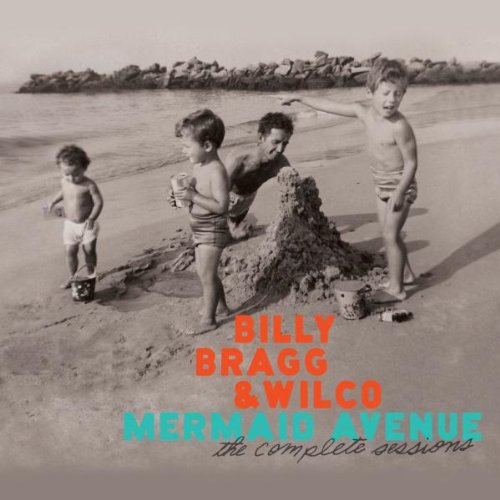
Billy Bragg/Wilco
Mermaid Avenue: The Complete Sessions
Release Date: Apr 21, 2012
Genre(s): Alternative Pop/Rock, Alternative Folk, Anti-Folk, Protest Songs
Record label: Nonesuch
Music Critic Score
How the Music Critic Score works
Buy Mermaid Avenue: The Complete Sessions from Amazon
Album Review: Mermaid Avenue: The Complete Sessions by Billy Bragg/Wilco
Exceptionally Good, Based on 7 Critics
Based on rating 5/5
1998's Mermaid Avenue rewrote Woody Guthrie's history through his unrecorded lyrics, revealing the joker, lover, boozer and horndog behind the icon. It let the artists rewrite themselves, too: Billy Bragg, the British folkie agitator, turned goofier ("My Flying Saucer"), while Wilco turned rootsier ("California Stars"). The selling point of this four-disc set is a third CD of new songs – weaker than the first two despite some gems like Bragg’'s deeply English ballad "Go Down to the Water" – and a DVD documentary that shows the rocky road to lasting art.
Based on rating 9/10
One of the criticisms levelled at the new Sean Penn movie This Must Be The Place is that whilst it captures the quirkiness of small-town America almost perfectly, it fails to comment on it. A fair enough point, and one that reminded me of the wonderful writing of Woody Guthrie, whose lyrics and music take the listener on a road trip through the heart of a fascinating country: Mark Twain set to an acoustic guitar, or a musical Kerouac (just about) on the wagon. In the documentary Man in the Sand Guthrie’s daughter Nora describes him as “Huckleberry Finn, floating past the settled folk on the shore, and very glad to be floating by”, combining the vernacular and the deeply personal with the political commentary that coloured the likes of ‘This Land is Your Land’.
Based on rating 9/10
In the documentary Man in the Sand, which chronicles the collaboration of Billy Bragg and Wilco to turn long-forgotten Woody Guthrie lyrics into actual songs, Bragg walks around Guthrie’s hometown of Okemah, Oklahoma, trying to get an idea of the people and surroundings that inspired the populist bard of American folk. Bragg wanders around deserted streets, talks to the locals, and even discovers the remains of Guthrie’s birthplace, the planks of wood tucked away in the corner of a local shop. In one scene, Bragg chats with a woman who runs an antique shop, hoping to find any artifact that might shed some light into Guthrie’s background or any clue into his experience as an Okie before he set across the country and back, chronicling his every adventure.
Based on rating 8.1/10
With the Occupy Wall Street demonstrations reviving interest in American protest music over the last six months, it seems inevitable that Woody Guthrie would enjoy a resurgence in popularity and relevance-- and just in time for what would have been his 100th birthday. The Okie folkie's example has guided many musicians as they set the 99% to song: Tom Morello wandered Zuccotti Park strumming "This Land Is Your Land", which won something called the Occupy Wall Street Award from MTV. Others, including Jackson Browne and Bruce Springsteen, have debuted starkly acoustic, highly rhetorical songs squarely in the Guthrie vein, suggesting that the OWS generation (or, more precisely, the pre-OWS generation with closer ties to the 1960s folkies like Dylan, who considered Woody a secular saint) equates Guthrie strictly with protest music and protest music strictly with Guthrie.
Based on rating 4/5
It was an idea that never should have worked. A British folk-rocker joins up with alt-country outliers to put music to the unreleased lyrics of Woody Guthrie. It wouldn’t have surprised anyone if it had diminished the reputation of all involved. Instead, Mermaid Avenue, performed by Billy Bragg and Wilco and released in 1998, was a revelation, proof that Guthrie was far more than the populist, fascist-bashing folkie that he was often perceived to be.
Based on rating B
This year marks Woody Guthrie’s 100th birthday, and our modern musicians have not let any commemorations fall by the wayside. The anniversary brings tribute concerts spread throughout the year, as well as new recordings by Guthrie’s legion of fans. A recent example is this year’s New Multitudes, a collaboration between Jay Farrar, Will Johnson, Anders Parker, and Yim Yames, which gives listeners the chance to hear previously unused lyrics by Guthrie, sung atop new music.
Opinion: Excellent
Still digging it: this is musical archaeology that’s full of life. Ninian Dunnett 2012 Thirty years after his death, Woody Guthrie was a distant memory when Mermaid Avenue came out in 1998. But he’s never been far away. You can hear the original Depression troubadour in the dustbowl romanticism and blue-collar unrest of every alt-country band that’s picked up a guitar – and the recession of a new century seems a good time to be remembering that.
'Mermaid Avenue: The Complete Sessions'
is available now

